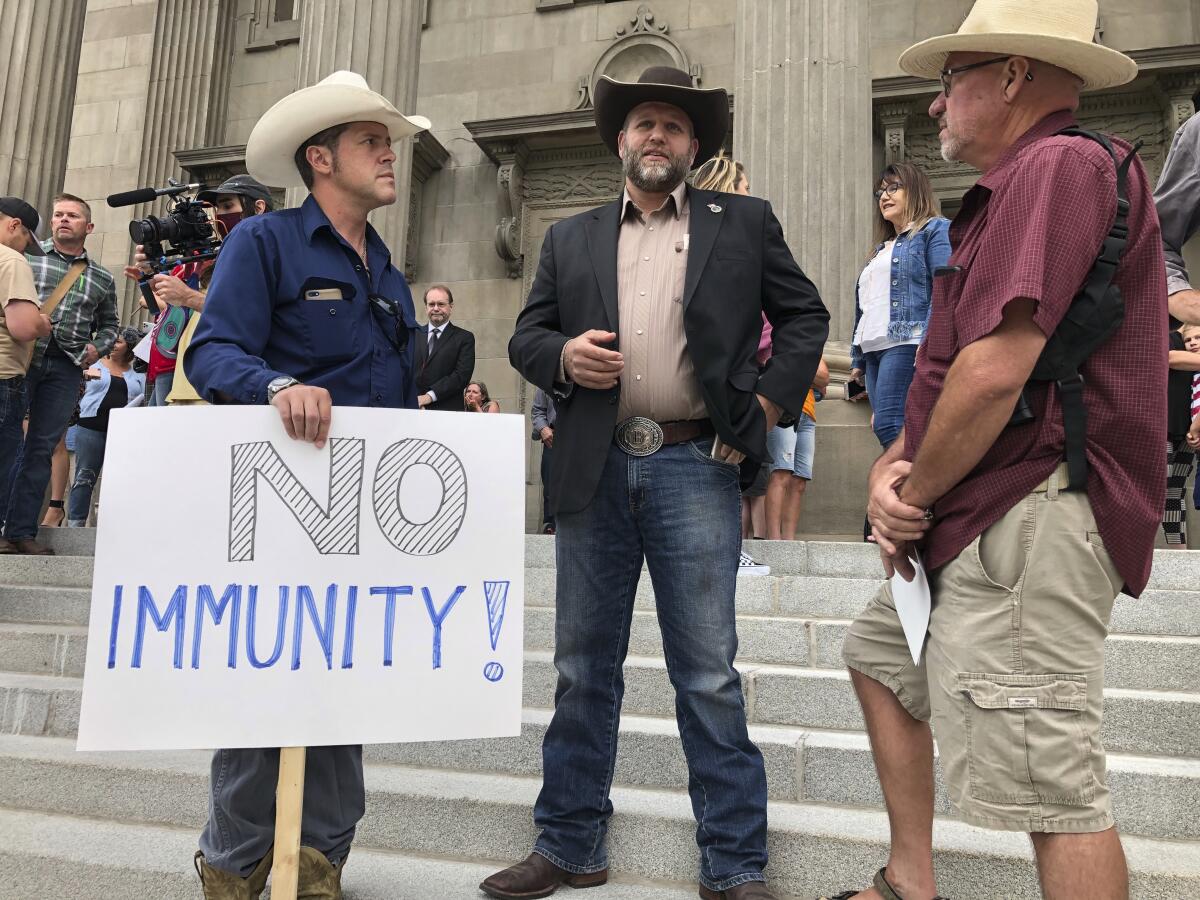Idaho bill to outlaw demonstrating at private homes advances

- Share via
BOISE, Idaho — A bill to make illegal demonstrating at a person’s residence headed to the full Idaho House of Representatives on Friday, after a series of demonstrations at the homes of officials and police officers spurred by frustration with restrictions on gatherings or mask-wearing mandates to slow coronavirus infections and deaths.
The House Judiciary, Rules and Administration Committee voted 11 to 4 to approve the bill backers say is needed to prevent mobs from trying to intimidate families in their homes.
The bill’s supporters say allowing the demonstrations will tear the social fabric by causing people to avoid public service or join police agencies.
“When we turn the volume up this high on political discourse, we crowd out anybody not willing to be equally as confrontational, angry, loud or violent,” Republican state Rep. Greg Chaney said. He is a co-sponsor of the legislation with Rep. Brooke Green, a Democrat from Boise.
In the last year, “a new playbook has been written, and several groups of individuals across the spectrum used it to terrify families in their homes,” Green said.
The public hearing drew so many people wanting to testify that comments were taken Wednesday and Friday. After Wednesday’s raucous hearing, torch- and pitchfork-wielding protesters gathered outside Chaney’s house that evening.
Law enforcement agencies support the bill.
“There’s a lot of turmoil over this last year, 2020 especially,” Canyon County Sheriff Kieran Donahue said. “But that agitation should not be taken to people’s individual homes.”
The American Civil Liberties Union of Idaho opposed the bill, saying it violated free speech rights and would be challenged in court if it became law. Chaney said the bill is modeled after an Arizona law that has been enforced for about 30 years.
Some who testified said they went to demonstrate at homes because their ability to protest at public meetings had been limited as government entities started meeting online to avoid spreading the virus.
“Why would I feel the need to go to their personal residences? It’s because I’m not being heard,” Del Chapel said. “That’s why. I’m not being heard. And when I feel like I’m not being heard, I’m going to go someplace where I can be heard.”
Many of those testifying against the bill used terms common among anti-government activist Ammon Bundy and his People’s Rights network, contending that people’s rights were being taken away. Bundy, who has picketed at people’s homes and encouraged others to do so, is banned from the Idaho Capitol following his two arrests in the building in August during a special session called to deal with the pandemic.
His People’s Rights network has grown significantly during the pandemic as precautions to avoid spreading the virus, such as mask mandates or limits on public and private gatherings, have been put in place.
For a time, gatherings of 10 or more in private residences were banned as COVID-19 deaths soared in Idaho and hospitals feared they would have to ration care.
“If you had left our houses alone, we would have left your houses alone as well,” Jessica Marcu of Nampa told lawmakers.
Many of those testifying Wednesday veered away from the topic of the legislation to make personal attacks on lawmakers, particularly Chaney, the system in general and members of the media. The committee room had a significant police presence both days.
Before voting Friday, lawmakers said they struggled to come to a decision on the bill.
Republican Rep. David Cannon said he decided to support the bill because the wealthy can insulate themselves behind gated communities, while those he called the “common” people couldn’t and would be easy targets for home demonstrators.
The unintended consequence is “we drive them away and we’re going to be governed by the elites,” he said.
Republican Rep. Ryan Kerby, a former teacher and school superintendent, said society functions productively only when people don’t have to worry about their homes.
“People need to be able to feel safe and secure in their homes,” he said. “I don’t think our society is going to work at a high level of productivity if people do not want to participate in government.”
Republican Reps. Ron Nate and Julianne Young opposed the bill, saying that they appreciated the idea but that it was too broad. Nate said it could prevent protests at a public site if a private home was nearby.
More to Read
Sign up for Essential California
The most important California stories and recommendations in your inbox every morning.
You may occasionally receive promotional content from the Los Angeles Times.













